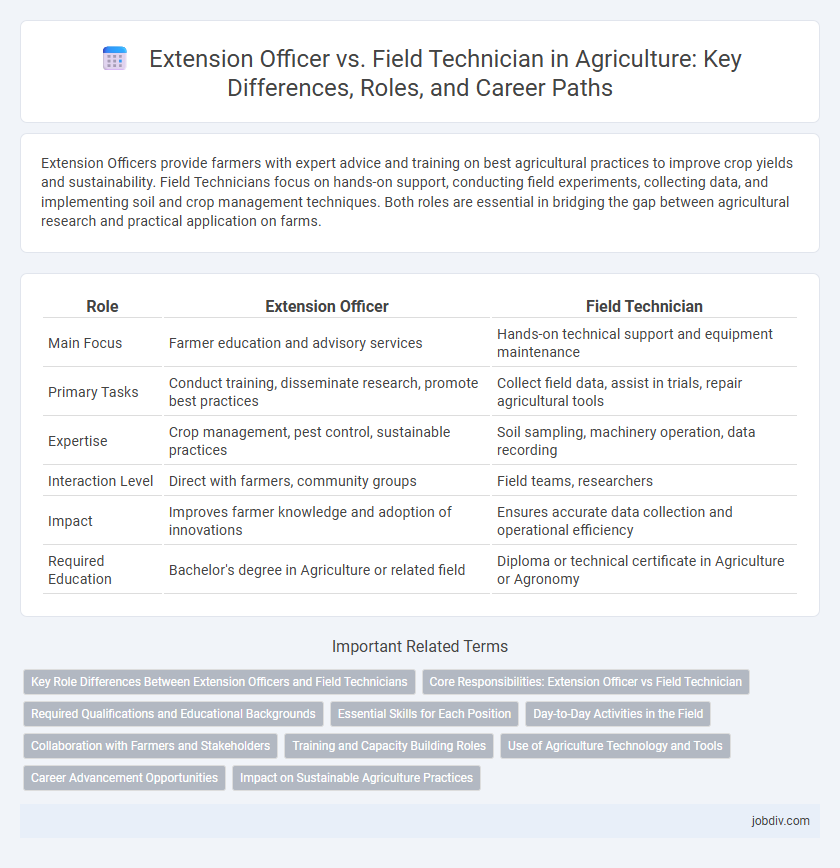Extension Officers provide farmers with expert advice and training on best agricultural practices to improve crop yields and sustainability. Field Technicians focus on hands-on support, conducting field experiments, collecting data, and implementing soil and crop management techniques. Both roles are essential in bridging the gap between agricultural research and practical application on farms.
Table of Comparison
| Role | Extension Officer | Field Technician |
|---|---|---|
| Main Focus | Farmer education and advisory services | Hands-on technical support and equipment maintenance |
| Primary Tasks | Conduct training, disseminate research, promote best practices | Collect field data, assist in trials, repair agricultural tools |
| Expertise | Crop management, pest control, sustainable practices | Soil sampling, machinery operation, data recording |
| Interaction Level | Direct with farmers, community groups | Field teams, researchers |
| Impact | Improves farmer knowledge and adoption of innovations | Ensures accurate data collection and operational efficiency |
| Required Education | Bachelor's degree in Agriculture or related field | Diploma or technical certificate in Agriculture or Agronomy |
Key Role Differences Between Extension Officers and Field Technicians
Extension Officers primarily focus on educating farmers by providing tailored advice on crop management, pest control, and sustainable practices, acting as a bridge between research institutions and the agricultural community. Field Technicians concentrate on hands-on fieldwork such as soil sampling, data collection, and implementing experimental treatments to support research and monitor crop conditions. While Extension Officers drive knowledge transfer and farmer empowerment, Field Technicians ensure accurate field data and practical application of agricultural innovations.
Core Responsibilities: Extension Officer vs Field Technician
Extension Officers primarily focus on disseminating agricultural knowledge, advising farmers on best practices, and facilitating training sessions to improve crop yield and sustainability. Field Technicians are responsible for collecting field data, monitoring crop health, conducting soil tests, and implementing pest control measures to support the Extension Officer's recommendations. Both roles collaborate closely to enhance farm productivity through practical application and technical support.
Required Qualifications and Educational Backgrounds
Extension Officers typically hold a bachelor's degree in agricultural science, agronomy, or a related field, emphasizing strong communication skills to educate farmers on best practices and innovations. Field Technicians usually possess an associate degree or technical certification in agricultural technology or crop management, with hands-on experience in operating equipment and conducting field trials. Both roles require knowledge of crop production, pest control, and soil management, but Extension Officers focus more on advisory services while Field Technicians handle practical, technical tasks in the field.
Essential Skills for Each Position
Extension Officers excel in communication, problem-solving, and advisory skills essential for educating farmers on best agricultural practices and implementing development programs. Field Technicians require proficiency in technical skills such as soil sampling, equipment operation, and data collection to support crop management and field trials. Both roles demand knowledge of agronomy, but Extension Officers emphasize community engagement while Field Technicians focus on hands-on fieldwork and technical accuracy.
Day-to-Day Activities in the Field
Extension Officers engage with farmers to provide education on sustainable practices, conduct field demonstrations, and collect data to tailor advice for crop improvement. Field Technicians perform hands-on tasks including soil sampling, equipment maintenance, pest monitoring, and recording environmental parameters to support agricultural research. Both roles collaborate closely to enhance crop yield and ensure the implementation of effective farming techniques on a daily basis.
Collaboration with Farmers and Stakeholders
Extension Officers facilitate knowledge transfer by organizing training sessions and providing tailored advice to farmers, enhancing adoption of best agricultural practices. Field Technicians implement field-level operations, collect data, and offer hands-on support directly on farms, ensuring practical application of innovations. Their collaboration fosters a feedback loop between research institutions, farmers, and agricultural stakeholders, driving sustainable productivity improvements.
Training and Capacity Building Roles
Extension Officers lead training programs to enhance farmers' knowledge of sustainable agricultural practices and innovative technologies. Field Technicians conduct hands-on demonstrations and provide technical support to ensure proper implementation of farming techniques. Both roles are essential in capacity building, with Extension Officers focusing on education strategy and Field Technicians on practical skill development.
Use of Agriculture Technology and Tools
Extension Officers leverage advanced agriculture technology to provide strategic guidance and training to farmers, utilizing digital platforms, remote sensing, and data analytics for effective decision-making. Field Technicians focus on hands-on application and maintenance of agricultural tools such as soil sensors, irrigation systems, and crop monitoring devices, ensuring optimal functionality and real-time data collection. Both roles are critical in integrating modern agricultural technology to enhance productivity and sustainable farming practices.
Career Advancement Opportunities
Extension Officers typically have broader career advancement opportunities in agriculture due to their roles in community education, policy advocacy, and program management, which often lead to supervisory or administrative positions. Field Technicians usually advance by gaining specialized technical skills and certifications, enabling them to move into senior technical roles or equipment management positions. Both career paths benefit from continuous professional development, but Extension Officers generally have a greater potential for roles involving leadership and strategic planning.
Impact on Sustainable Agriculture Practices
Extension Officers play a pivotal role in promoting sustainable agriculture by providing farmers with expert advice on eco-friendly techniques, crop rotation, and integrated pest management, thereby enhancing soil health and biodiversity. Field Technicians support these efforts through hands-on implementation, monitoring crop conditions, and collecting data that informs adaptive management strategies. Their combined efforts improve resource efficiency, reduce environmental impact, and drive long-term agricultural sustainability.
Extension Officer vs Field Technician Infographic

 jobdiv.com
jobdiv.com